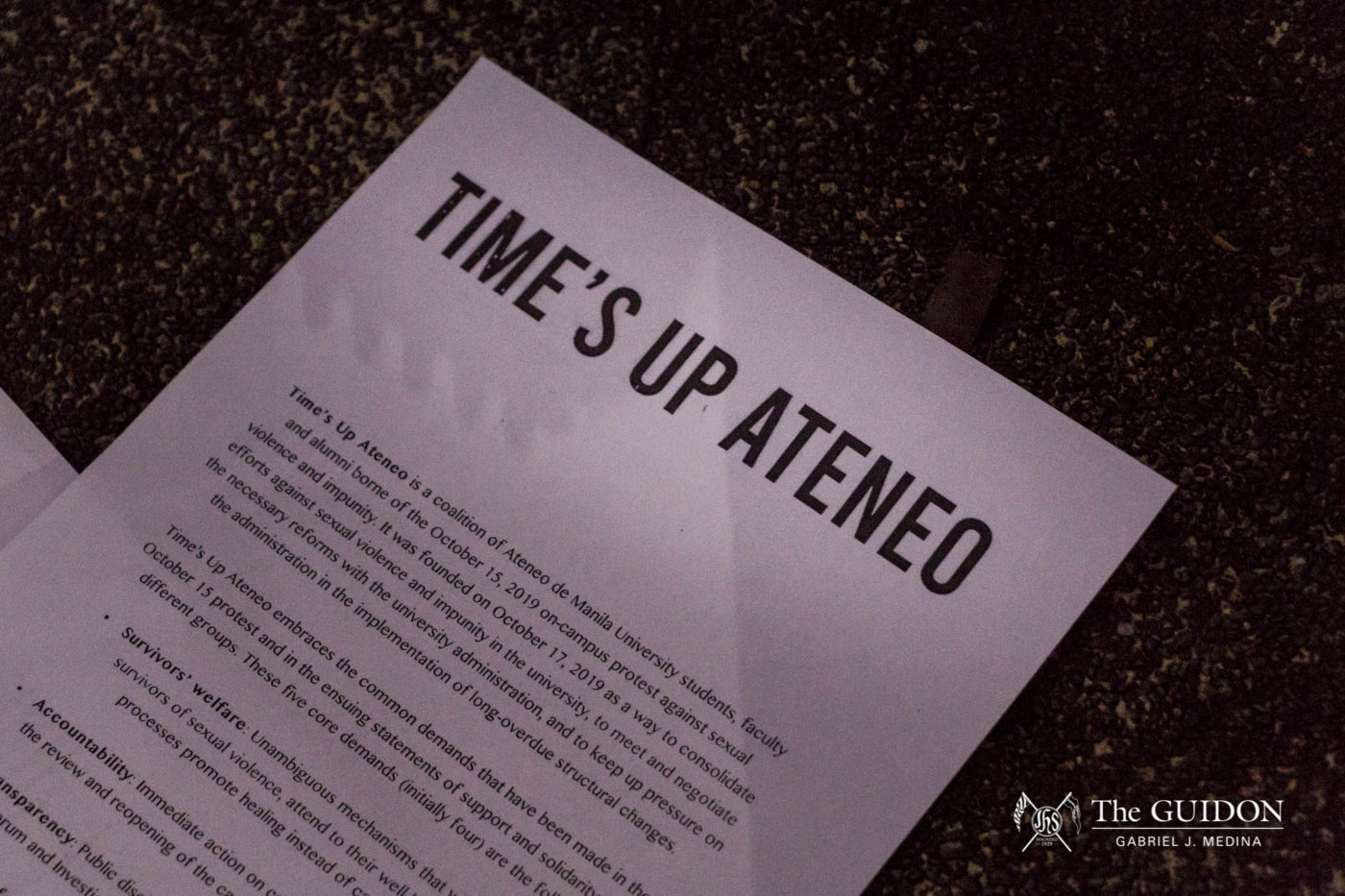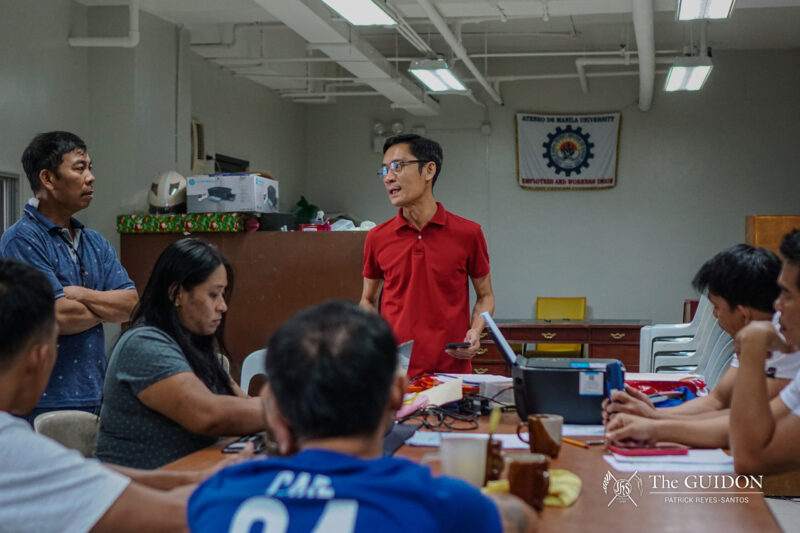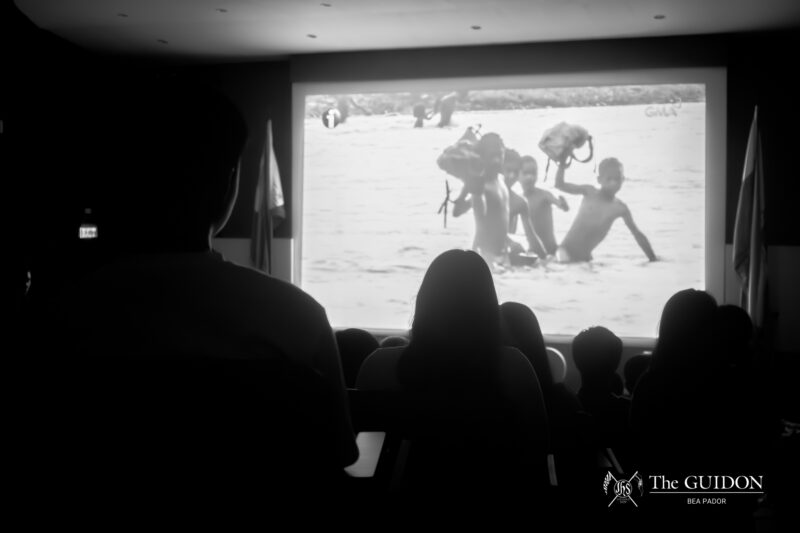IN COMMEMORATION of the October 2019 on-campus protest against sexual misconduct and impunity, Time’s Up Ateneo (TUA) group released a statement on its second anniversary that called upon the University administration to “confront complicity and make amends.”
The statement highlighted the “disappointing” response of the University administration regarding their inaction towards fighting sexual violence and institutional complicity. Among other calls, TUA also emphasized the need for improved correspondence with the survivors due to the challenges presented by the online setup.
In response to the said protest, then-University President Jose Ramon Villarin, SJ, released a memorandum last October 23, 2019 on behalf of the administration. The memo claimed that no formal complaints have been filed against former English Department assistant professor Mary Thomas and former Philosophy Department professor Jesus “Jade” Deogracias Principe, PhD, which TUA contests.
According to TUA’s recent statement, they have yet to receive a reply from University President Roberto Yap, SJ regarding Villarin’s memorandum and TUA’s February 15 joint statement with the Sanggunian Commission on Anti-Sexual Misconduct and Violence (CASMV).
Confronting complicity
TUA’s second year since founding was marked with demands following the administration’s “disappointing” response to their unaddressed concerns.
In their joint statement, TUA and CASMV called for survivor-centered and trauma-informed community response in addressing sexual violence, as well as the rectification of the aforementioned memo. They also called for the administration to release survivors from any Non-Disclosure Agreements, and to refrain from “weaponizing” the Data Privacy Act against survivors. The joint statement was published in light of the personal accounts released by TUA to commemorate the one-year anniversary of the protest.
The concern with Villarin’s October 2019 memorandum, which allegedly discredited the survivors’ and advocates’ narratives, troubles TUA as the unaddressed concern “constitutes an active, continuing harm that damages the survivors’ well-being.”
Along with this, TUA referenced the landmark audit that the University requested to be done on its processes in handling sexual harassment cases. TUA also cited the audit to remark on the “festering” issues surrounding specific sexual harassment complaints.
“While the audit was completed in June 2020 and made available upon request in April 2021, Ms. Illo’s observation still holds true today,” the statement read.
Through independent auditor Jeanne Frances I. Illo’s findings, the Code of Decorum and Administrative Rules on Sexual Harassment, Other Forms of Sexual Conduct and Inappropriate Behavior (Code and Rules) replaced the previous Anti-Sexual Harassment Policy. Emphasizing the need for improvement, TUA and CASMV claimed that the old processes and procedures were “opaque, insensitive, and retraumatizing.”
This was also raised in the previous sexual harassment cases that initially sparked the protest. One survivor who filed a case against Principe described the experience of filing a complaint under the old system as an “unclear, frustrating, and inhumane” process.
A community of care
In their recent statement, TUA also urged the University to make amends with victims that “suffered” from the previous system’s shortcomings.
In line with this, TUA and CASMV outlined possible first steps towards making amends in their joint statement. Along with the rectification of Villarin’s memo, this also involves a “genuine apology” for its contents.
“We ask [the University administration] to be transparent to the community, beginning with the correction of misleading information, and the release of pertinent updates regarding the specific matters and cases discussed in the said memorandum,” the statement read.
With Yap’s silence on TUA’s concerns in the previous year, the coalition’s recent statement also provided what it hopes to see from the University moving forward.
Apart from the call to make amends with sexual harassment survivors, TUA called on the University to remain responsive towards survivors’ unique experiences as sexual harassment takes on new forms in this remote set-up. With the online setting brought about by the limitations of the COVID-19 pandemic, the organization reminded the University that the Code and Rules should be a “living document” that is continuously updated and reformed.
TUA also expressed sadness because their participation in the drafting and audit of the Code and Rules has gone without public recognition from the University offices.
“We have been a part of Ateneo history for the last two years, but the institution, it feels to us, cannot deign to acknowledge that. We may be acknowledged in private, official correspondence and in closed-door meetings, but never, it seems, in the resulting documents or in public releases,” the statement read.
Despite this “erasure,” TUA emphasized that it has never wavered in its community building. It continues to stand with survivors, inviting the entire Ateneo community to stand with them and join their “community of care.”







